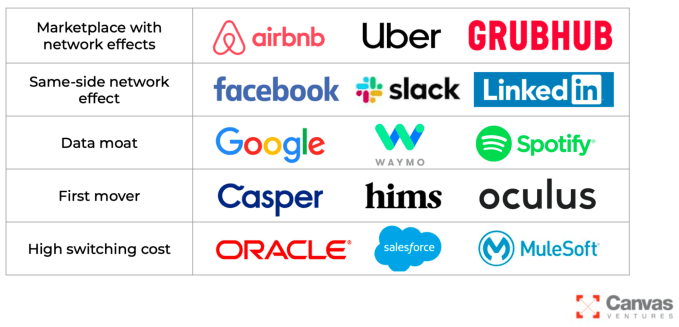Mike Ghaffary
More posts from Mike Ghaffary
Whether you’re building a company or thinking about investing, it’s important to understand your strategic advantage. In order to determine one, you should ask fundamental questions like: What’s the long-term, sustainable reason that the company will stay in business?
The most important elements for founders to consider when figuring out their strategic advantage(s) include one-sided or “direct” network effects (e.g., with social media sites like Facebook), marketplace network effects (e.g., with two-sided marketplaces like Uber), data moats, first mover and switching costs.
Let’s take a quick look at an example of one-sided network effects. At the very earliest stages of Facebook’s existence, it was just Mark Zuckerberg, a few friends and their basic profiles. The nascent social media platform wasn’t useful beyond a few dorm rooms. They needed a strategic advantage or the company would not make it beyond the edge of campus.
In fact, Facebook only truly became a useful platform — and accelerated as a business — when more users came into the fold and more types of email addresses were accepted. Add to that the introduction of an ad marketplace revenue model and you have a clear strategic advantage — based on one-sided network effects — that gave Facebook a strategic edge over other early social media sites like MySpace.
These one-sided network effects are different from two-sided network effects.

Two-sided network effects are most common in marketplace business models. In a two-sided network, supply and demand are matched, like Uber riders (demand) being matched with Uber drivers (supply). The Uber product is not necessarily more valuable just because more users (riders) join, the way Facebook is more valuable when more users join.
In fact, when more users (riders) join the demand side of the Uber network, it might actually be worse for the user experience — it’s harder to find a driver and wait times get longer. The demand side (riders) gets value from more supply (drivers) joining the platform and vice-versa. That’s why it’s called a two-sided network, or a marketplace.
Regardless of industry, a successful startup without a strategic advantage is just a validated business model vulnerable to copycat companies looking for a market entry point. Copycats can range in size from startups with similar grit to large companies like Facebook or Google that have limitless resources to drive competition into the market, and potentially run the startup with the original idea out of business. This vulnerability can prove fatal unless a startup’s founding team explores and embraces one or more strategic advantages.
More specifically, startup founders need to uncover a strategic advantage that is: (1) tied to their mission; (2) additive for the particular industry or use case; (3) informed by network effects or defenses such as switching costs or data moats; and (4) an end-user experience that draws more users or an offering that scales with growing demand. For example, Uber became truly useful when UberX was introduced to enable regular folks to drive on the supply side and more riders to find a more affordable way to travel on the demand side.
How to evaluate strategic advantage
Most investors will be skeptical of a startup’s long-term viability and investment quality unless they see a clear strategic advantage in the initial meetings. In fact, many will walk away unless founders deliver a clear plan to realize the full extent of the advantage in their pitch deck.
Founders shouldn’t materially alter their pitch to cater to investors, but they should put in the time to examine their business for a strategic advantage and devise a way to measure success. If you’re looking for a place to start evaluating your startup’s strategic advantage, consider the following questions:
What does liquidity look like?
For each strategic advantage, a startup should associate a marquee metric that captures success within the broader industry context and makes sense for the company’s specific business model. In Uber’s case, the operative strategic advantage metric in the early days of app-based transportation was the average wait time given the high user demand for convenient and affordable rides.
According to an early head of growth at the company, every minute shaved from rider wait times generated a significant spike in user acquisition — a finding that still helps Uber retain a large share of the ride-hailing market today.
What are the switching costs?
If your startup is in the consumer space, a marketplace or a customer-centric industry like interior design or real estate, it’s vital to measure switching costs. They can be large or minuscule, but there’s often more to the switching costs equation than just dollars. Regardless of the industry and operating model, founders need to understand the full value of switching to a competitor’s version from their own platform, marketplace or offering.
Ride-hailing is a clear example where two companies, Uber and Lyft, hold the majority of market share with competitors far behind. To switch from Uber to Lyft, a customer needs to be logged-in to both apps with a credit card, wallet or bank account attached. They also need to enter personal information, like their home and work addresses, to use the platform well.
This is where concern for privacy and security adds to the cost of individual Lyft rides and UberEats orders. Many people have both Lyft and Uber active on their phones because the companies have earned consumer trust, brand recognition and market share. However, significantly fewer have a third ride-hailing app like Via or Wingz due to these additional factors.
Which side of the network values the other more?
This question is most applicable to startups with a marketplace business model. In the early days of Uber and Lyft, for instance, riders clearly valued the availability of drivers more because it was difficult to hail a cab or find a public transit alternative, especially in big cities like New York.
This dynamic changed as the ride-hailing industry scaled and growth started depending just as much on attracting drivers to the platform (with Uber and Lyft leading the way). But riders held the value majority on Day One, and early entrants Uber and Lyft knew their survival — and challenge of defeating third-party apps — depended on finding people rides as quickly as possible.
The importance of doing homework
It’s a solid bet that the investors and VCs founders are pitching to have dedicated a large portion of their careers, life and education to understanding both the business and academic side of industry. While I do not think an MBA is necessary to succeed in business as an operator or investor (disclaimer: I do have one), I think it’s vital for founders in pursuit of funding to do the homework.
Look at the history of your chosen industry, understand the market forces at play, who the category leaders are, where consumer demand gaps might allow for strategic advantage and what lessons from other companies’ successes and failures apply to your specific business model.
Whether you choose to dive into the academic side of business, you should familiarize yourself with Porter’s 5 Forces. Many VCs, in particular, will come into founder meetings with hard questions built around these principles.
Many will think founders have fully mapped the industry they’re in — be it real estate, healthcare, transportation, finance or something else — to make the roadmap toward achieving strategic advantage as granular as possible. If nothing else, founders should get comfortable with all this to close the preparedness gap and meet investors on a more level playing field.
VCs may also enter the meeting thinking founders have come up with 100 ways to achieve strategic advantage. While you may not need 100, you should be able to tell investors why your vetted strategic advantage separates your company from the pack, and how it will be impacted by industry- or marketplace-specific network effects.
For founders who commonly come across investor questions like, “What happens if Google decides to copy you?,” I recommend coming up with a valid model for how long it would take a Big Tech company to do just that. I’d also plan to dive into why your business model is tough to replicate overnight. At the very least, investors will take you seriously and understand you came to secure funding for a sustainable business with long-term prospects and a solid plan for success.
Additionally, never underestimate the power of approaching a legacy market and competitive landscape with fresh eyes. When you’re in the initial pitch meeting, make it a point to outline the clear differences in business model, strategic advantage, and user or customer experience your startup provides. Convince investors (and your founding stakeholders) by leaning into why the company would succeed even if a Google or a Microsoft chooses to replicate the concept.
Understanding how fundraising terms can affect early-stage startups
The best strategic advantage is having at least one
Startup leaders should be concerned if their company doesn’t currently have a strategic advantage, because even if business is good now, it won’t be for long without one. There are simply too many opportunities for other companies to introduce a slightly more appealing alternative and for users to move on for a variety of reasons.
As Harvard Business School Professor Tom Eisenmann points out, the odds are already stacked heavily against startups regardless of the strength of their operating models, product or service roadmaps, and value proposition. That’s why it’s crucial for founders to put in the effort to understand the value of strategic advantage, thoroughly evaluate market dynamics and network effects to unveil one or multiple, and do the homework necessary to crisply present why their company is sustainably different — and more resilient — than anything in existence.






























Comment